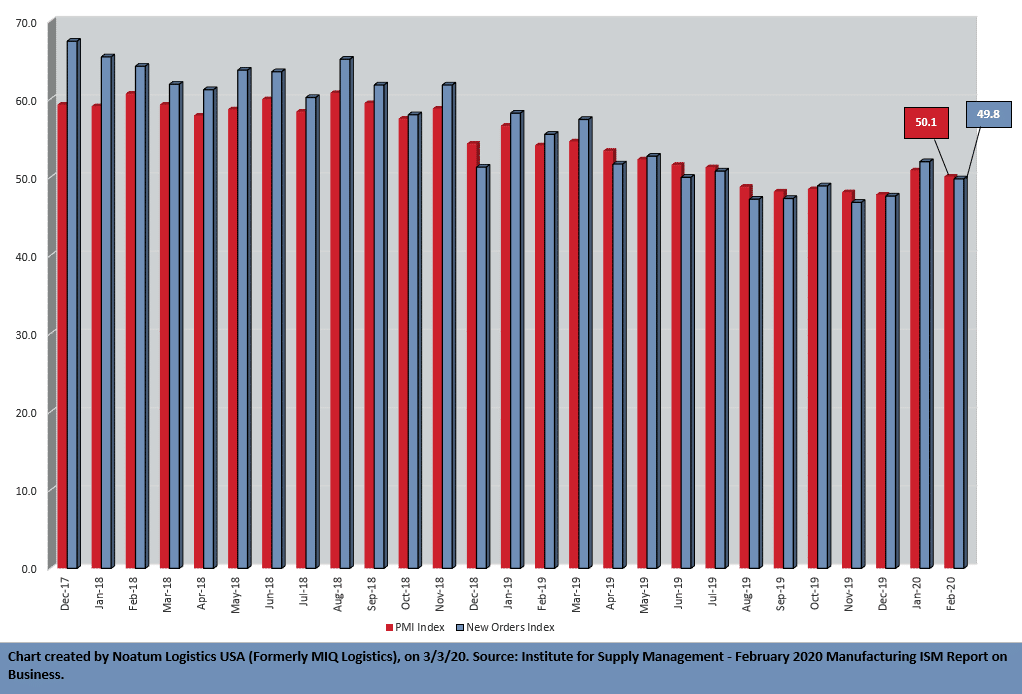Source: Institute for Supply Management – March 2, 2020 Release
Economic activity in the manufacturing sector grew in February, and the overall economy grew for the 130th consecutive month, say the nation’s supply executives in the latest Manufacturing ISM® Report On Business®.

The report was issued today by Timothy R. Fiore, CPSM, C.P.M., Chair of the Institute for Supply Management® (ISM®) Manufacturing Business Survey Committee: “The February PMI® registered 50.1 percent, down 0.8 percentage point from the January reading of 50.9 percent. The New Orders Index registered 49.8 percent, a decrease of 2.2 percentage points from the January reading of 52 percent. The Production Index registered 50.3 percent, down 4 percentage points compared to the January reading of 54.3 percent. The Backlog of Orders Index registered 50.3 percent, an increase of 4.6 percentage points compared to the January reading of 45.7 percent. The Employment Index registered 46.9 percent, an increase of 0.3 percentage point from the January reading of 46.6 percent. The Supplier Deliveries Index registered 57.3 percent, up 4.4 percentage points from the January reading of 52.9 percent. The Inventories Index registered 46.5 percent, 2.3 percentage points lower than the January reading of 48.8 percent. The Prices Index registered 45.9 percent, down 7.4 percentage points as compared to the January reading of 53.3 percent. The New Export Orders Index registered 51.2 percent, a decrease of 2.1 percentage points as compared to the January reading of 53.3 percent. The Imports Index registered 42.6 percent, an 8.7-percentage point decrease from the January reading of 51.3 percent.
“Comments from the panel were generally positive, with sentiment cautious compared to January. The PMI® remained in expansion territory, but at a weak level. Demand slumped, with (1) the New Orders Index contracting at a weak level, despite new export order expansion, (2) the Customers’ Inventories Index remaining at ‘too low’ status and (3) the Backlog of Orders Index expanding for the first time in several months, but at a slow rate. Consumption (measured by the Production and Employment indexes) contributed negatively (a combined 3.7-percentage point decrease) to the PMI® calculation. Inputs — expressed as supplier deliveries, inventories and imports — strengthened in February, due primarily to supplier deliveries expanding, offset partially by inventories declining. Despite imports contraction returning at a strong rate, inputs contributed positively to the PMI® calculation, a reversal from the previous month. (The Supplier Deliveries and Inventories indexes directly factor into the PMI®; the Imports Index does not.) Prices returned to contraction, at moderately strong levels.
“Global supply chains are impacting most, if not all, of the manufacturing industry sectors. Among the six big industry sectors, Food, Beverage & Tobacco Products remains the strongest, followed by Computer & Electronic Products. Petroleum & Coal Products is the weakest. Overall, sentiment this month is marginally positive regarding near-term growth,” says Fiore.
Of the 18 manufacturing industries, the 14 that reported growth in February — listed in order — are: Wood Products; Furniture & Related Products; Plastics & Rubber Products; Printing & Related Support Activities; Paper Products; Textile Mills; Primary Metals; Food, Beverage & Tobacco Products; Computer & Electronic Products; Miscellaneous Manufacturing; Electrical Equipment, Appliances & Components; Fabricated Metal Products; Machinery; and Chemical Products. The three industries reporting contraction in February are: Petroleum & Coal Products; Transportation Equipment; and Nonmetallic Mineral Products.
Click here to access the entire release from the Institute for Supply Management website.
